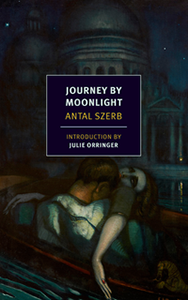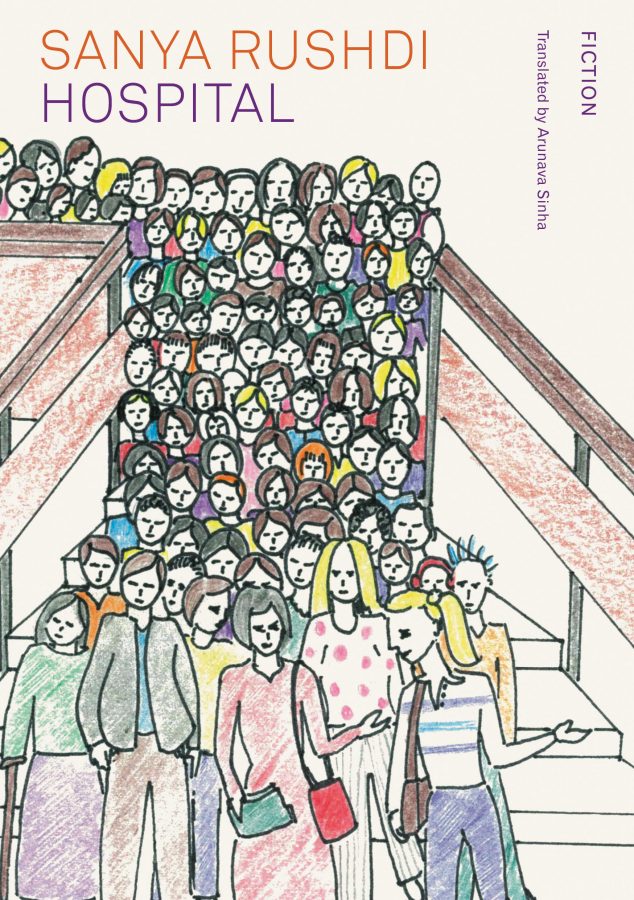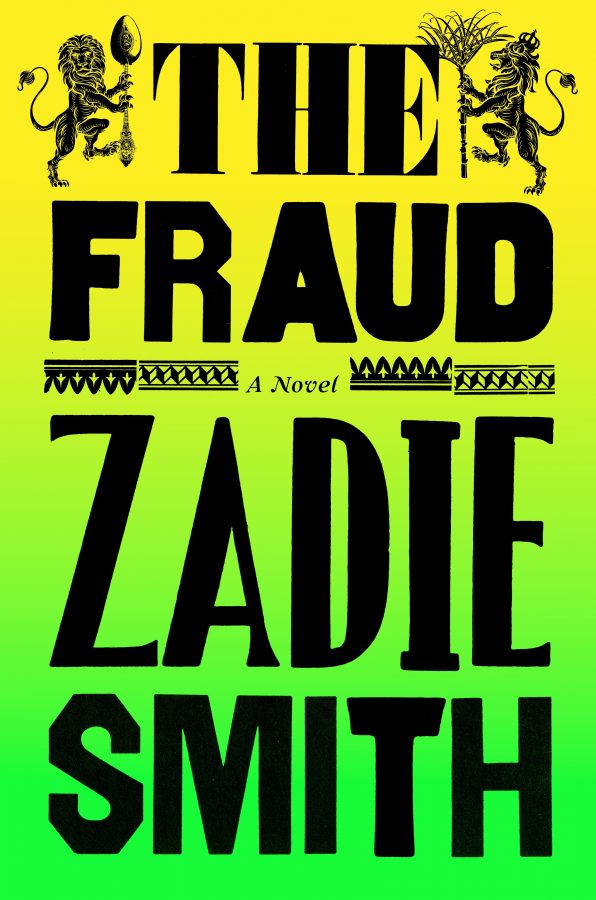In 1936, the Hungarian writer Antal Szerb arrived in the centre of the world. In Mussolini’s Italy only wonderful things were happening. Everyone was deliriously happy. The newspapers confirmed it. And Venice was the city where, Szerb could see, ‘the Faustian rush to infinite expansion came to a halt’. There was no way to expand: you can’t improve on perfection. The railway that delivered Szerb to this land of miracles was a beautiful thing, connecting all of Europe. Travel promised romance, new landscapes, hotels, cafés. It would be Szerb’s last trip abroad.
When Szerb returned to Budapest, he sat down to write his masterpiece Journey by Moonlight. Young lovers Mihály and Erszi are honeymooning in Italy. They travel to all the places the author had just been: Venice, Ravenna, San Marino, Guiddo, Verona. But while Szerb strolled the city streets alone, disconcerted by the ripples of fascism, Mihály always has plenty of company. He keeps bumping into old friends like a boat against a dock.
The trip begins to go amiss in the opening lines: ‘On the train everything seemed fine. The trouble began in Venice, with the back-alleys.’ Late on the couple’s first night in Venice, Mihály leaves Erszi at their hotel to have one last tiny drink. He heads straight for the back-alleys, the way a curious audience member might ‘accidentally’ slip backstage at a theatre. The narrator asks us:
What is the strange attraction, the peculiar ecstasy that seized him in the back-alleys? Why did it feel like finally coming home?
The alleys delighted Szerb, too. Their narrowness was glorious, offering a single, right path. In his travel book, The Third Tower: Journeys in Italy (1936), Szerb dedicates an entire chapter to the magic of back-alleys, joyfully observing that some are ‘so narrow two overweight men cannot pass through them walking side by side’. To walk through them is to return to childhood, a confined place that is easily and suddenly outgrown. In the back-alleys Mihály has the authentic Venetian travel experience promised in guidebooks the world over. When he stumbles out into the open streets, day is breaking. He realises he is on the ‘far side’ of Venice, within sight of the island that was once home to a leper colony and the hospital from which gondolas transporting the city’s dead set out. Although Mihaly meets no one, he emerges a changed man. Meanwhile, Erszi has appealed to the police to find him. Their reunion takes place outside their hotel in the pale light of dawn. Erszi confronts him, ringing her hands. She is full of questions. Mihály thinks, ‘So this is marriage’.
Antal Szerb was born in Budapest in 1901 to Jewish parents. He was an academic, novelist and historian loved for his masterful use of irony. His knack for irony can be traced to a very young age. In a diary entry dated April 1918, he writes:
I have won the Greek rhetoric competition … I have also won the Lord-Prize for the best essay. … The boys gave me a huge ovation … I am now a famous person.
He later described his writing style as ‘neo-frivolous’.
Szerb’s earliest published writings appeared in the Hungarian literary journal, the Nyugat Review. A digital archive of Nyugat is published online in the original Hungarian. The archive begins in 1908 with 24 issues published that year, and ends abruptly in 1941 with just eight issues. Scrolling through the digital pages, one finds pieces by Desző Kosztolányi, Gyula Krúdy, Sándor Márai, Margit Kaffka, Frigyes Karinthy – Hungary’s greatest contributors to modernism and experimental writing. In Hungary, streets and parks in their neighborhoods now bear the names of these writers; further afield, the same names inspire the shrugging of shoulders.
Szerb’s first foray into literature beyond the pages of Nyugat was his History of Hungarian Literature (1934), a book that was hugely ambitious and a little reckless. It was criticised by academics and banned in schools. Szerb playfully complained:
People in this country expect scholarly works to be unreadable; from which they are led, quite logically, to the erroneous conclusion that anything that is readable must not be scholarly. A great many critics have reproved the relaxed, often slightly mocking tone of my books, insisting that I cannot possibly respect literature if I talk about it in such a cheerfully familiar way.
Szerb poked fun at academia whenever he could. In Journey by Moonlight, Mihály’s academic friend, Professor Waldheim, displays photographs of ‘My distinguished self in pyjamas … my distinguished self in the buff’. In The Pendragon Legend (1934), János the academic triumphantly opens a locked door with the remark, ‘It now dawned on me how very clever I was to have once perused an excellent standard work on old English locksmithery.’
Szerb’s disdain for academia did not curtail his pursuit of a new standard of research. His next book was The History of World Literature (1941), a serious undertaking – although, it must be said, Szerb’s ‘world’ did not extend to Africa or Asia. He also attempted to anthologise the most beautiful poems in the world, organising them under the categories of ‘loners’, ‘lovers’, ‘sorrows’, ‘nights‘ and ‘visions’. These early works are not available in English, though most of his novels are now available in beautiful translations by Len Rix published by NYRB Classics and Pushkin Press. The novels betray Szerb’s love of different forms and genres. He tried his hand at gothic parody (The Pendragon Legend), historical fiction (Oliver VII and The Queen’s Necklace – both 1943), travel writing (The Third Tower: Journeys Through Italy) and short fiction (Love in a Bottle, 1935). But Journey by Moonlight stands apart. It is the book that was placed in Rix’s hand by a Hungarian friend who firmly insisted he read it, adding: ‘Every educated Hungarian knows and loves this book.’
Mihály and Erszi carry on with their honeymoon. They travel to Ravenna. The morning after they arrive, Mihály rises early and slips away from Erszi again. He sets off to see the city’s famous Byzantine mosaics, ‘monuments from his private past’, which he has never seen. He does this alone because
In the matter of art history she was much better informed, and much more discerning, than he, and she had visited Italy before, so he generally left it up to her what they would see, and what they would think when they saw it.
How quickly marriage goes from commitment to lobotomy! The mosaics are the exception to Mihaly’s complacent approach to works of art because they remind him of his childhood friends, Tamás and Éva. They had once pored over images of the Ravenna mosaics together and were ‘seized by a restless and inexplicable dread’. The glittery gold tiles stirred ‘a horror deep within their souls’.
Szerb reflects on the same mosaics in The Third Tower:
In these Byzantine images you find an almost baffling unity: on the one hand, a kind of urbane world-weariness, a courtly effeminacy in the gestures and faces; and on the other, a primitive innocence of technique.
This ‘baffling unity’ – the perfect mix of world-weariness and innocence – is perhaps what so disturbed the children. For them, the mosaics were not art; they were relics that held morbid lessons they could not ignore. Staring back at them from the tiles were the faces of people who did not know what was coming to them. In this way, the mosaics were also mirrors, showing the children their own deaths, teaching that one cannot see one’s own moment in history, but can only innocently and blindly go on.
The next day a motorcycle roars into a little piazza where Mihály and Erszi sit minding their own business. The rider jumps off his bike, walks straight to them and says: ‘Hello Mihály, I was looking for you.’ He is János, Mihály’s childhood friend and rival, and he is another great knock to their marital boat. The old friends quickly return to a decade-old dispute. Mihály thinks János is angry with him because he wrongly accused him of stealing his watch at a party in London. János tells him that he did steal the watch, which has nothing to do with anything. He tells Mihály that he is angry at him for not looking for ‘people who have gone out of your life’. He announces that he has located their long lost friend Ervin, whom he believes is in ‘some monastery’ in Tuscany or Umbria. And Mihály should look for him straight away.
This is only the first time a character appears, apparently out of nowhere, to hurtle the adventure forward. The narrative is built around such sudden arrivals, which occur in rapid staggered succession. Appearing like apparitions, Mihály’s old and new friends have messages for him, and they deliver them as if at the bidding of his unconscious. They arrive like the odd and perfect figures of our dreams. If this is Mihály’s unconscious at work, his unconscious is not subtle. The messages grab him by the neck and throw him off course, until he finds an unlikely rhythm, which becomes the rhythm of the book and its distinctive style. Its technique is not magical realism or fantasy; it works according to a rule whereby that which is deeply needed yet unlikely somehow seems to take place.
Journey By Moonlight is often said to be a book about nostalgia. Szerb himself said so. Agnes MacDonald, in her dissertation on the Nyugat writers – the only English text on the subject more detailed than a Wikipedia entry – quotes from a letter Szerb wrote in 1937:
Now I am writing a novel about nostalgia. It will be something like Le Grand Meaulnes and Les Enfants terribles. The plot will take place in Italy, of course. Assissi, Gubbio. Have you been there before?
Of course, the book is nostalgic. It is nostalgic for childhood, nostalgic for Europe before Mussolini and Hitler. But the real return to the past in Journey By Moonlight is not to childhood, but to a time before Mihály sold out. Marrying Erszi, who does all the shopping, seeing and thinking for both of them, would have been despicable to his younger self.
The large cast of honeymoon-crashers harkens back and brings healthy chaos back into Mihály’s world. Mihály, János and Ervin were part of a gang that hung around with the siblings Tamas and Éva Ulpius. Their favorite game was to play out each other’s deaths. Mihály states:
I really enjoyed being the sacrificial victim. It was the first thing I thought about when I woke up, and I looked forward to it the whole day long, yes …
When Erszi asks why, he replies, ‘Hmmm … well, for erotic reasons, if you follow me.’ She doesn’t. She does not grasp the idea Georges Bataille expressed in a paradox: that ‘eroticism, it may be said, is assenting to life up to the point of death’. One of the things eroticism can be is a ‘psychological quest’, not to bridge the ‘deep gulf’ that exists between us as ‘discontinuous beings’, but to ‘experience its dizziness together’. Bataille writes: ‘The gulf is death in one sense, and death is vertiginous, death is hypnotising.’
The petites morts the children act out together are quietly, wildly erotic, dizzying for sure, and all the more pleasurable for their implied finality, which is played on repeat. Bataille might have used Mihály’s favourite childhood memory to illustrate the theory that eroticism itself is cardinally nostalgic:
We are discontinuous beings, individuals who perish in isolation in the midst of an incomprehensible adventure, but we yearn for our lost continuity. We find the state of affairs that binds us to our random and ephemeral individuality hard to bear. Along with our tormenting desire that this evanescent thing should last, there stands our obsession with a primal continuity linking us with everything that is.
More confusingly, Éva is only the ‘erotic catalyst’ for the children’s games. It is Támas whom Mihály describes as his ‘ideal’. In 1988, the translator Peter Hartigai met Szerb’s widow, Klara Szerb, and asked if she knew the biographical touchstones for the characters Tamas and Éva:
By way of an answer, Mrs. Szerb directed my attention to a framed photograph, one of many in her bookcase. The picture showed a youngish man with a pale, aristocratic, melancholy face.
‘This is Tamás,’ Mrs. Szerb said. ‘My husband’s beloved schoolmate.’
‘And Éva? Who is Éva?’ I asked. She held up that very picture.
‘This is also Éva. Tamás and Éva are one in the same.’
Éva and Tamas may both be a sweet tribute to Szerb’s childhood crush. But Klara Szerb’s revelation does not explain why Éva and Tamas were not one character in the book. The use of two characters allows for a refraction of homosexual desire, but it is also a jab at conformity. To love a brother and sister is to reject all expectation. There is no pattern of orientation, no social trajectory. It is definitely to reject the prospect of marriage. In a more practical sense, without Éva the other boys, János and Ervin, would not have understood the pleasure of their games. The dysfunctional siblings live their shorter, more reckless lives in parallel to Mihály and Erszi’s. Támas commits suicide as a young man. Eva disappears the night before her wedding. They both escape.
In marriage, and in romances with siblings for that matter, Szerb had a number of successes. In college, he was entangled in a romance with two sisters. His first great love was Klára Lakner. When their relationship didn’t work out, he rebounded with Lilla Lakner, Klára’s younger sister, whom he married in 1925. They had a daughter, but their marriage was short-lived. In 1938, Szerb did eventually marry happily, this time to with Klara Balnit, the daughter of Nyugat writer Aladár Bálint. In the intervening years, Szerb was alone and abroad in Paris and London.
The honeymoon ends. On their trip to Rome, Mihály jumps off the train to grab an espresso and jumps back on, only to discover he is on a different train, heading not to Rome but Perugia. Oh well! He makes his way to Umbria, the place of Ervin’s rumoured retreat. He has his appetite back. After escaping a ‘fascista’ who recognizes him – not as his own man, but as Erszi’s lost husband – he finds himself in a strange hotel with plenty of time to think. He paces as the narrator muses: ‘You start off as Mr X, who happens to be an engineer, and sooner or later you’re just an engineer who happens to be called Mr X.’
A day ago, Mihály was Erszi’s husband and a respectable businessman. Today he is a nameless person with only the clothes on his back. After a quick succession of self-inflicted disasters, including running out on a restaurant bill, he tumbles down a hill into a ravine, knocking himself unconscious, and promptly forgets all the Italian he knows. When he wakes up, a kindly nurse is looking down at him. Everything is clean and white. He is being taken care of. He feels a new calm. A doctor who speaks English is called to his bedside. The doctor assures Mihály that nothing is wrong with him. This has always been Mihály’s dream: to be in a hospital:
Not seriously ill or suffering, but as at present, just lying there in passive and involuntary exhaustion, being nursed, without purpose or desire, far from the normal business of men.
In hospital, nothing is expected of him but to breathe in and out. And even that part is optional.
Mihály is released. He sticks around Italy and finds Ervin in a monastery in Gubbio. He asks Ervin:
Do you monks also have the feeling that time goes forward, and the every little bit of it has a special truth? Do you have a sense of history? If you recall some event can you say if it happened in 1932 or in 1933?
Ervin tells him, ‘No. It’s one of the blessings of our lot that God lifts us out of time.’ But even monks are not exempt from death. Ervin begins to cough violently. His cough is a reminder of the days he was a chain smoker in his youth. Monks may be lifted out of time, but not their lungs. Ervin soon dies, refusing medical aid.
The flair of Szerb’s fiction is that he does the close reading for you. Professor Waldheim appears late in the book – he is an old friend, of course. While he and Mihály stroll past paintings of men and women leading each other to their deaths, Waldheim explains:
Those Etruscans were perfectly aware that dying is an erotic art … These people probably feared death even more than we do. Our civilization presents us with a marvelous mental machinery designed to help us forget, for most of our lives, that one day we too will die.
So civilisation – bourgeois European civilisation, at least – is a trick. Only without a sense of your own death, can you carry on a respectable life. Mihály’s formative passion was a desire to die – no wonder his great attempt at being civilised is impossible. Szerb, who grew up in a bourgeois family, loathed bourgeois ‘civilisation’ which, he wrote, ‘amounts to little more than “when I die I want hot and cold running water in my tomb”’.
During the Second World War, Szerb was sent to a forced labor camp in Balf. On New Years Eve 1944, he recited both Shakespeare and the Hungarian poet Attila József to his friends in the camp. He was too weak to stand that day. In 1945, months before the war’s end, Szerb was beaten to death and buried in a mass grave. Years later, every corpse in the grave would be exhumed by Klara Szerb.
On Mihály’s last night in Italy, he appeals to Éva, who reappears out of nowhere. He asks her to help him commit suicide. Through a series of bizarre happenings, including being dragged to the baptism of a baby boy, Mihály stands Éva up. The next day his father arrives to collect him, and the wayward son gives in. He goes home with his father by train, to take up his old post in the family business. Mihály never escapes. His only hope is that there is a chance ‘something might still happen’ to him. It is a reassuring hope, something to tell himself as he looks out his office window in Budapest as history moves towards the Second World War. The last true note comes from the narrator, who advises, ‘Enjoy the wine today, tomorrow there’ll be none.’






